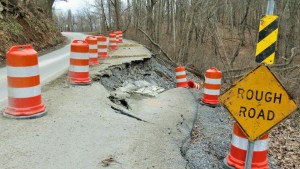A Real World Account of What it Means to be a Victim of the U.S. Fracking Boom
From an Article by Annie Leadingham-Seay, On-The-Road, May 17, 2015
What would you do if you bought your perfect home: acreage, creeks, waterfalls, home office, studio, gardens and orchards, gourmet kitchen and solitude; then your neighbors decided to lease their minerals to the oil and gas industry turning your entire neighborhood into an industrial zone? A place where roads crumbled and eroded under the weight of big rigs every day and your car suffers hundreds of dollars of suspension damage every six weeks. The hills you watched come alive each spring with wildflowers; honeybees and small waterfalls were sheered off and flattened to create roads for larger scale trucks and new industrial zones. Where your lifestyle was not only disrupted but also turned upside down with the onslaught of the oil and gas industry surrounding your property.
If a state’s minimum environmental regulation for the oil and gas industry is measured by the federal government, the system’s been rigged since the 70’s and more recently, 2005, thanks to the Energy Policy Act. If you happen to own property in West Virginia where the general consensus is that there are too many environmental regulations for big business, then you might want to take the time to understand just how these policies, or more accurately, exemptions, will affect your livelihood should pipelines and frack pads come to your area. And so it was, with little academic experience in the art of studying law, my friends and I scoured state bills, federal laws, real estate laws to build armor in the frack fight for our right to the pursuit of happiness.
Not a single one of us ever wanted to know what we now know, but life is funny that way. One day you’re blissfully tending to your gardens, working your job and in some cases enjoying retirement, the next day bulldozers and heavy trucks running 24/7 move in altering the landscape of sight and sound in an instant. At that moment, you realize, life on your property will never be the same because your neighbors sold out their pipeline access and mineral leases. Their actions have now lowered your property values, quality of life, health, and well-being.
Eight months ago I left the West Virginia battlefields of Frackistan after a long arduous battle that culminated in a deal with the very industry I was fighting against. It wasn’t what I had planned particularly since the remodel of my then dream home was completed only a year before. We had moved to the back hollers of West Virginia 10 years ago, leaving behind drought stricken California for a new life with 95 acres and an abundance of artesian spring water. Prior to the move to West Virginia, we spent five years planning and researching zoning rules that would enable us to build a straw bale workshop and test other sustainable theories including thermal mass for season extension of food crops, local food initiatives, renewable energy and micro hydro. Unfortunately, with our focus on sustainability and ample water we failed to do our own due diligence on the sociopolitical history of West Virginia.
The onslaught of fracking trucks create crumbling infrastructure, as shown in the photo above from the Doddridge County Watershed Association.
As each mineral owning neighbor leased to oil and gas companies, well pads were permitted. With each new well pad or pipeline, brought complete destruction of simple infrastructure: roads, phone lines, electrical interruptions, as well as quality of life issues. Sharing the small country roads with a variety of oversized commercial trucks meant putting your own life in danger simply driving anywhere.
Since the roads in rural areas were never built for this kind of traffic, the issues were sweeping: roads not wide enough for truck and car to pass safely; oil and gas industry employees routinely driving on the wrong side of the road, in a blind curve with a 20 foot or more drop over the side and no guard rail. It is remarkable that more citizens have not perished in the process; many were not so lucky.
With the onslaught of pre-fracking issues in what was once a sleepy area, dinner parties became a hot bed for legal discussions. Attendees were not lawyers, nor did we have any intention of becoming one but all came to the table armed with the latest policy revelation. No one truly grasps the need for understanding policy until one’s own property comes under attack. And nothing is more shocking to realize the fact that the policies in place are not to protect the private citizen’s right to the pursuit of happiness but to the right of a wildcatter extracting the minerals that lay beneath one’s private property.
>>> There is much more to this article, as can be seen here.
NOTE: This article appeared in The Forum, a print only newspaper for the St. Johns University School of Law. You can also find it as a Sustainicus blog entry here.

